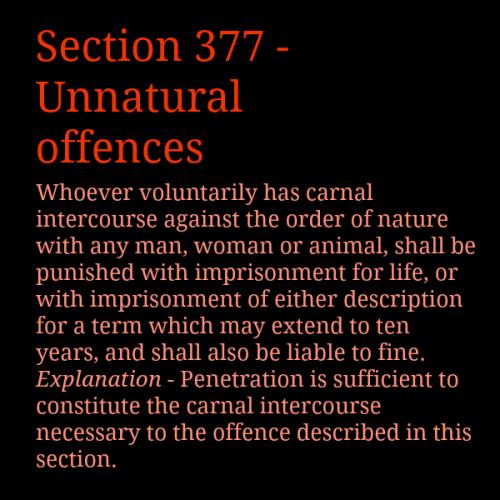
I am utterly dejected and disappointed. The day that could have been a landmark in the history of Indian judicial for passing one of the most progressive laws in the country became the “darkest day for freedom and human rights”.
The Supreme Court of India has reinstated the ban on Section 377 of the Indian Penal Code( 1860). The section in question criminalizes homosexual activities, even between two consenting adults. The section was challenged by the Naz Foundation in the High Court of Delhi in 2009. The Delhi High Court exhibited perhaps the rare case of judicial activism and de-criminalized Section 377. Four years later, the highest court of the country goes ahead and turns the clock back and criminalises the section once again.
This has proved that one of the most respected institutions of the Indian Democratic system is governed by the lot of fanatical and culturally fundamentalist people who have turned a blind eye to the waves of social change around them. To me, the reinstating of the ban is not just a blow to LGBT rights but to the concept of democracy. A democracy anywhere in the world takes conscious steps to keep religion and religious thoughts out of the preview of Individual freedom of actions and expression. This verdict is a colossal step backwards in this direction.
What is extremely surprising is that in recent years various courts, including the Supreme Court, have shown unexpected judicial activism, whether it was in regards to disregarding a woman’s previous sexual history while deciding a rape case or directing the Parliament of India to frame laws to protect female partners and children born in a live-in- relationship. It has always been the voice of sanity amidst the insanity that surrounds us. How can then the apex court uphold a law that seeks to govern the actions of the “private parts” of its citizens. A ruling that provided a ray of hope to gay rights activists and served to create a conducive environment towards social acceptance of the gay population in the country has succumbed to the age old logic of “appropriateness of the Indian culture”. While giving such logic we tend to conveniently forget that “kinnars” or that the trans -gender population has been an important part of “Indian” tradition. We conveniently forget that there are thousands of people who are affected by such regressive laws. People cannot express their love towards their partners because they are in a same sex relationship, cannot hope for becoming parents because the law forbids adoption by gay couples. The list goes on. In a bid to “save” the Indian culture from the evil hands of the west, we end up destroying the most fundamental unit of any society i.e. the family. Thousand of potential families do not see the light of day because our law refuses to see them as families.
India is a great believer in the separation of powers. The laws are made by the legislature and enforced by the judiciary. The roles and the ambit of the two pillars of democracy are very clear. To say it is the job of the parliament to amend the issue is washing hands of its responsibility.
A law is nothing if not barbaric if it treats the choices of two consenting adults as criminal. A law can criminalize a person’s right to have sex with a same sex person, but it cannot prevent the person from being gay.
I cannot help but think of all my friends whose faces shone with victory after years of struggle when the Delhi High Court regarded Section 377 as unconstitutional. It was a riot of colours as the “rainbow” shined with all its might. The same rainbow has now been overcast by heavy clouds of religious fanaticism and awaits its freedom. But the fight is far from over. Human dignity refuses to bow its head in front of the draconian and dictatorial verdict. We will continue to fight for what is rightfully ours.










Add new comment